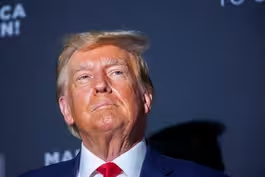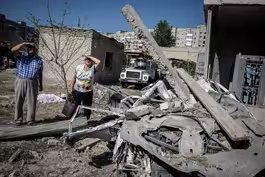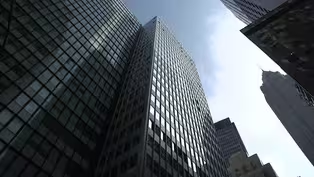
Interior Secretary on new monument protecting tribal land
Clip: 8/8/2023 | 6m 24sVideo has Closed Captions
Interior Secretary discusses importance of new national monument protecting tribal land
President Biden headed to Arizona Tuesday where he made an announcement designating some million acres of land around the Grand Canyon as a national monument. The move would stop future uranium mining projects on the land, marking a key victory for environmentalists and tribal leaders. Department of Interior Secretary Deb Haaland joined Amna Nawaz to discuss the designation.
Problems playing video? | Closed Captioning Feedback
Problems playing video? | Closed Captioning Feedback
Major corporate funding for the PBS News Hour is provided by BDO, BNSF, Consumer Cellular, American Cruise Lines, and Raymond James. Funding for the PBS NewsHour Weekend is provided by...

Interior Secretary on new monument protecting tribal land
Clip: 8/8/2023 | 6m 24sVideo has Closed Captions
President Biden headed to Arizona Tuesday where he made an announcement designating some million acres of land around the Grand Canyon as a national monument. The move would stop future uranium mining projects on the land, marking a key victory for environmentalists and tribal leaders. Department of Interior Secretary Deb Haaland joined Amna Nawaz to discuss the designation.
Problems playing video? | Closed Captioning Feedback
How to Watch PBS News Hour
PBS News Hour is available to stream on pbs.org and the free PBS App, available on iPhone, Apple TV, Android TV, Android smartphones, Amazon Fire TV, Amazon Fire Tablet, Roku, Samsung Smart TV, and Vizio.
Providing Support for PBS.org
Learn Moreabout PBS online sponsorshipAMNA NAWAZ: President Biden headed to Arizona today, where he made an historic announcement, designating some million acres of land around the Grand Canyon as a national monument protected by the government.
JOE BIDEN, President of the United States: By creating this monument, we're setting aside new spaces for families to hike, bike, hunt, fish, and camp, growing a tourism economy that already accounts for 11 percent of all Arizona jobs.
Folks, preserving these lands is good, not only for Arizona, but for the planet.
It's good for the economy.
It's good for the soul of the nation, and I believe with my core -- in my core it's the right thing to do.
(CHEERING AND APPLAUSE) AMNA NAWAZ: The move would stop future uranium mining projects on the land, marking a key victory for environmentalists and tribal leaders, who have long noted the historical and cultural significance of the land to Native tribes.
Department of Interior Secretary Deb Haaland visited the area and met with tribal leaders just a few months ago.
She joins me now.
Secretary Haaland, welcome, and thank you for joining us.
DEB HAALAND, U.S.
Interior Secretary: Thank you for having me.
AMNA NAWAZ: So, you have described your may visit to the area as one of the most meaningful trips of your life.
Explain to us why this land is so important to indigenous communities.
DEB HAALAND: Yes.
Well, earlier in the summer, we had an opportunity to hike down the Grand Canyon to Supai Village to visit with the tribe there who live at the bottom of the Grand Canyon.
At one time, they were banished from their ancestral homelands.
And it took a lot of work by tribal leaders and supporters and some lawsuits.
And they were painstaking about needing their travel homelands back.
They were back there on the floor of the Grand Canyon.
They had a chance to visit with people where they are.
And it's -- it was astounding.
They're living on the lands that their ancestors lived on, those beautiful blue-green waterfalls.
They cherish that land.
The bones of their ancestors are there.
And so I understand how important that those places are to the tribes.
AMNA NAWAZ: And we should note, statewide, in Arizona, there is broad support for the move that President Biden made today.
But there are some concerns from local ranchers and from others.
Republican Senator Mitt Romney of Utah says renters in Southern Utah will also be impacted.
He also expressed concerns about U.S. energy independence.
He said: "By eliminating this important source of uranium, President Biden has increased both our dependence on Russia and China and our ultimate carbon footprint."
Is he wrong?
DEB HAALAND: Thank you so much.
Well, I will address the collaboration issue first.
We have many public meetings.
This is what you would call collaborative conservation, where tribes and organizations and people get together and work towards something that they want.
But this hasn't gone -- this didn't just happen since President Biden came into office.
This is a decades-long, step by step, one step forward, another half-baby step forward.
People have been working on this issue for decades.
And we're happy that we're able to get it done under this administration.
With respect to the lands that are conserved as a national monument, it doesn't -- it excludes valid existing rights.
And people who have valid existing rights within that area will keep those.
That includes folks who have current mining operations or those claims.
Additionally, we should all know -- and I think most people do know -- that this land has already been -- it's -- we're going with the status quo.
The land has already been protected.
It had a 20-year withdrawal on these parcels of land.
And there are places to mine, and there are places not to mine.
And this area, as I said, with the bones of these tribal ancestors, with thousands of cultural sites and ecosystems that sustain wildlife and species that we don't see every day, those places are too special to mine.
AMNA NAWAZ: If I may, Secretary, the climate crisis message, I'm sure, resonates on the ground in Arizona, where they have seen record high temperatures.
We know President Biden spoke about it as well today.
But broadly among Americans, some 57 percent disapprove of this president, the administration's handling of the climate crisis.
Why do you think that is?
DEB HAALAND: Well, the president today in his remarks talked about his goal of conserving 30 percent of our land and waters by 2030.
He has conserved more land and waters than any president since John F. Kennedy, I believe.
(CROSSTALK) AMNA NAWAZ: If I may, I apologize for the interruption.
I know our time is limited.
Why do you think people disapprove of his handling?
DEB HAALAND: Well, I'm saying I feel very strongly that perhaps the message isn't getting out, right?
I mean, this has -- this has been the best president in modern history for conservation of our lands.
And those conserved lands, they are -- they help avert the climate crisis.
So we're going to keep doing what we're doing.
The president has clean energy goals.
We have conservation goals.
I feel very honored to serve under him.
And we're going to keep moving forward.
AMNA NAWAZ: That is Secretary of the Interior Deb Haaland joining us tonight.
Secretary Haaland, thank you very much for joining us.
Please come back soon.
Breaking down Trump's claims he can't get a fair trial
Video has Closed Captions
Clip: 8/8/2023 | 6m 47s | Breaking down Trump's claims he can't get a fair trial in 2020 election case (6m 47s)
Casualties mount as Ukraine's counteroffensive continues
Video has Closed Captions
Clip: 8/8/2023 | 10m 16s | Casualties mount as Ukraine's counteroffensive continues slow progress (10m 16s)
How cities are converting vacant offices into housing
Video has Closed Captions
Clip: 8/8/2023 | 7m 59s | How some U.S. cities are converting vacant office spaces into housing (7m 59s)
James McBride discusses the themes in his new new novel
Video has Closed Captions
Clip: 8/8/2023 | 7m 5s | James McBride discusses the themes in his new novel, 'The Heaven and Earth Grocery Store' (7m 5s)
Report explores doctors spreading COVID misinformation
Video has Closed Captions
Clip: 8/8/2023 | 6m 41s | Investigation reveals lack of consequences for doctors spreading COVID misinformation (6m 41s)
Providing Support for PBS.org
Learn Moreabout PBS online sponsorship
- News and Public Affairs

FRONTLINE is investigative journalism that questions, explains and changes our world.

- News and Public Affairs

Amanpour and Company features conversations with leaders and decision makers.












Support for PBS provided by:
Major corporate funding for the PBS News Hour is provided by BDO, BNSF, Consumer Cellular, American Cruise Lines, and Raymond James. Funding for the PBS NewsHour Weekend is provided by...





